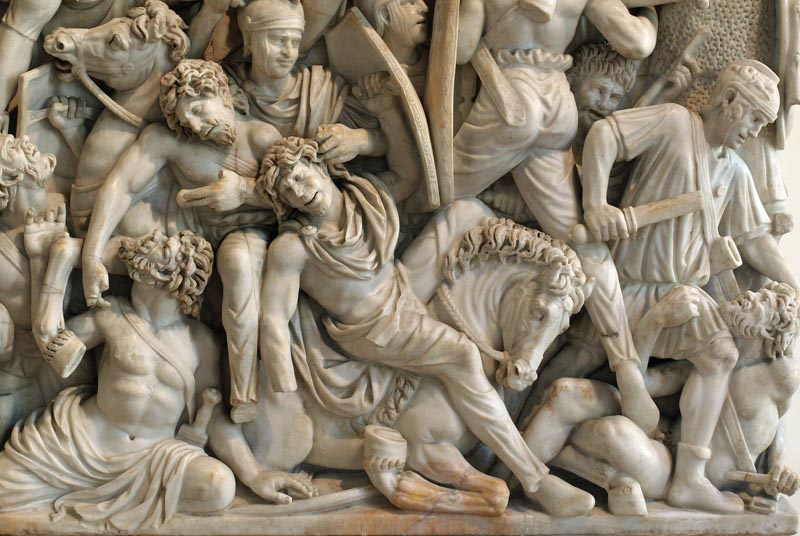
THE POLITICAL AND MILITARY conflicts between the Roman Empire and its German antagonists lasted hundreds of years, concluding, as we’ve been told, with the germanification of the Western empire. But did it? One could easily argue that in overrunning the Latin West, Germans were eventually colonized by Roman culture with its literacy, urbanity, and money economy – or at least that they were deeply, lastingly influenced by it. In such circumstances, it’s difficult to say who the real winners were.
Traces of this struggle live on in the low-level but persistent contemporary sniping between wine drinkers and beer lovers. The crudely binary nature of this opposition is daily re-enacted and reinforced in popular culture and aspects of self-regard. Wine enthusiasts as latter day Romans, heirs of a literate, cosmopolitan, elitist tradition; beer drinkers as back-to-the-future Allemani and thus loyal to an oral, tribal, egalitarian tradition Call it Toga vs. Trousers: The Rematch, though neither side is likely to admit to any of this.
Perusing a new book by Jamie Goode, who blogs at the popular wineanorak.com site, and Master of Wine Sam Harrop, brought all this back to mind this morning. Their joint effort, Authentic wine: Toward natural and sustainable winemaking is a stimulating and useful book I’ll be posting more about in the next few weeks.
Meanwhile, I’d like to explore a hypothesis – wholly unproveable by the way – that’s been rattling around in my head for a few years having to do with the natural wine movement (in part the subject of Goode and Harrop’s book) and the big, unspoken assumption that may constitute the movement’s founding myth. The idea has its roots in University of Bologna Professor Massimo Montanari’s wonderful little book, The culture of food published in 1996, where Montanari is at pains to point out a fundamental difference between how Romans and Germans conceived of and used land.
In brief, the ideal Romans landscape was one that had been transformed by the hand of man. They delighted in the fields and pastures which, neatly divided by hedgerows and low stonewalls, served as a theater for the practice of rational agriculture. Mountains, forests, marshes and other places unreclaimed from the domain of pure nature were alien geographies, a dark and forbidding realm of uncultivated and unregulated growth that was fundamentally inhuman.
For animist Germans, on the other hand, the forest in all its mystery, rife with sacred springs and hallowed oaks, was not only home but the source of spiritual and physical sustenance. In this sensibility, nature is something holy and eternal, not at all alien. To seek to dominate and re-create it is an act of sacrilege.
I think you can guess where I’m going with this. The natural wine movement (I’m conflating a complex of ideas and practices in this one phrase) has powerful affiliations with these Teutonic assumptions about nature. A tendency to value the primitive over the sophisticated, and the accidental over the intentional, as well as an inclination to devalue attempts to alter nature in ways designed to make it more conformable to human needs, all point to this.
Of course, I’m hardly an impartial observer. One reason I have my suspicions about the natural wine movement is that in this conflict of world views (you may have guessed) I wear a toga.
Originally published on Boston.com
Reach me at stephenmeuse@icloud.com
Follow @stephen_meuse